Inside The EIWA Seeding Process That Dropped Glory And Yianni To #2 Spots
Inside The EIWA Seeding Process That Dropped Glory And Yianni To #2 Spots
The EIWA's numeric seeding formula dropped two of its biggest stars to #2 seeds and left some conference coaches frustrated about the process.

Yianni Diakomihalis has never lost an EIWA match.
Not this season. Not last year. Not at any point in his career.
Cornell’s three-time NCAA champion went 7-0 against conference opponents this season with five technical falls, a pin and an 8-3 victory against Penn’s Doug Zapf, who was awarded the #1 seed at 149 pounds for this weekend’s EIWA Championships.
Meanwhile, six months after finishing second in the World, Diakomihalis is seeded second in the EIWA.
“It’s embarrassing,” Princeton coach Chris Ayres said. “Get the seeds right. Everyone knows what it should’ve been.”
There was a seemingly obvious #1 seed at 125 pounds as well. Two-time EIWA champion Patrick Glory, the league’s wrestler of the year in 2020 and a three-time conference finalist, is 16-0 this season. The returning NCAA finalist’s list of victories this season includes a major decision win against Cornell’s Brett Ungar.
So you can probably imagine the reaction that followed earlier this week when the EIWA’s mathematical formula churned out the seeds for this weekend’s conference tournament and Unger was seeded first, ahead of three wrestlers who defeated him this season — Glory, Penn’s Ryan Miller and Harvard’s Diego Sotelo.
“The seeds came out and first thing I see is Glory and Yianni as #2 seeds and I think all of us were like, ‘That’s ridiculous,’” Lehigh coach Pat Santoro said. “I thought for sure we’d put our heads together and vote on it, but it got derailed even before the voting started. Everybody had their opinion that we put this formula in place and that’s the way it should be.
“My thing was we put the formula in place to get an outline of where we should be and then it’s up to us coaches to use common sense and do the right thing. Is there anybody in the country that doesn’t think Glory and Yianni should be #1? I think it’s egregious. One guy’s undefeated and the other’s going for his fourth title. I thought it was a no-brainer. Of course, when those two got denied everything else was off the table.”
Several years back, the EIWA followed the NCAA’s lead and went to a formula-driven approach to seeding its conference tournament. The league’s coaches worked to come up with a numerical system based off current-year data that would eliminate the bickering and brokering that were often part of seeding meetings around the country.
The EIWA’s system rewards wrestlers for quality wins, their standing in the NCAA coaches’ rankings and RPI rankings and their winning percentage at their weight class.
“The math that we use is really good,” Ayres said. “It’s a really good starting point. We don’t have these long seeding meetings … but you’ve got to have the human element at the end of the day.”
That became evident in 2020 when a late lineup change threw a wrench into the EIWA seeding formula at 149 pounds. Two-time EIWA champion Matthew Kolodzik initially planned not to compete that season before returning to the Princeton lineup in February. He took an undefeated record into the conference tournament, where he drew the #4 seed.
“That kind of shook things up,” Ayres said, “because that was way off.”
Kolodzik went on to win the tournament and also became an agent of change — or so it seemed. His situation prompted conference coaches to add a human element to the seeding process.
“Everyone agreed — 100 percent — if the Kolodzik thing comes up again, we have to have some way to deal with that situation. That was crazy. That was dumb,” Ayres said. “So what happened through these meetings was we came out with an outlier clause. If 13 coaches vote in favor of an individual being an outlier and the formula didn’t represent what they should be seeded, then we could talk about that and have a vote to see what the change would be.”
The outlier clause was supposed to serve as a failsafe for EIWA coaches in the event the numeric formula turned out something that didn’t look quite right.
But Ayres and Santoro said there wasn’t enough traction to put the outlier clause to use with coaches either clinging to the formula or perhaps hoping to steer clear of Glory and Diakomihalis in the brackets.
“I think the outlier clause is pointless,” Ayres said.
Said Santoro: “It was disappointing because we put something in place to have some logic and have some coaches’ eyeballs on it to make informed decisions and we never really got to those discussions. It was kind of like everybody just said this is the formula, this is the way it is. The whole reason we put the outlier in place was to discuss it.”
The formula was apparently skewed by the NCAA’s RPI rankings, where Ungar ranks fourth at 125 and Zapf is fifth at 149. Glory and Diakomihalis, on the other hand, did not have enough matches to qualify for an RPI rank.
Neither did Lehigh’s Connor McGonagle and two-time EIWA champ Josh Humphreys. McGonagle is ranked fifth nationally at 133 and Humphreys is #4 at 157. After going undefeated against conference opponents this season, they drew #4 and #2 seeds respectively, for the EIWA Championships, though there’s a strong case to be made that they should’ve been bumped up higher in the seedings.
“I got calls from coaches from other conferences saying, ‘What are you guys thinking?’” Santoro said. “I was like, ‘Well, it really wasn’t up for debate. It was the formula and that was it.
“The piece that we put in place to get it right, we just ignored it, and that was the tough part about it.”